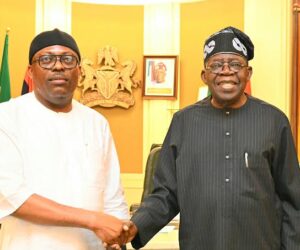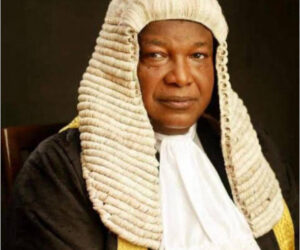1
The confirmation of Professor Joash Ojo Amupitan, SAN, as the 13th Chairman of the Independent National Electoral Commission (INEC) marks a defining moment in Nigeria’s democratic journey. His appointment, coming after the decade-long leadership of Professor Mahmood Yakubu, signals both continuity and the urgent need for reform within an electoral institution whose credibility has been questioned repeatedly.
Professor Amupitan, a distinguished scholar of law and governance, brings to the Commission over three decades of academic, administrative, and legal experience. A product of the University of Jos, where he earned his LL.B, LL.M, and Ph.D degrees, Amupitan is not only an accomplished academic but also a Senior Advocate of Nigeria (SAN) recognised for his integrity and scholarship in Evidence Law and Corporate Governance.
Yet, beyond his sterling credentials lies an enormous responsibility, the burden to restore faith in Nigeria’s electoral system and to prove that INEC can truly live up to its constitutional designation as an independent body.
As human rights lawyer and senior advocate, Ebun-Olu Adegboruwa, observed in a recent commentary thus, “Public perception about the organisation is very low, and once there is lack of confidence in the electoral process, the outcome becomes susceptible to suspicion and needless rejection.”
This skepticism is not unfounded. The controversies surrounding the 2023 general elections, including delayed result transmission, technological glitches, and contested outcomes across multiple states, left scars that have yet to heal. As Amupitan assumes office, his first challenge is not just to conduct elections, but to rebuild trust.
INEC’s reputation has always swung between moments of progress and episodes of public doubt. From the reforms initiated under Attahiru Jega to the mixed record of Yakubu’s tenure, Nigerians have experienced both the promise and pitfalls of electoral administration. The introduction of technology, especially the Bimodal Voter Accreditation System (BVAS) and the INEC Result Viewing Portal (iREV) raised public expectations for transparency. But when these systems faltered during critical moments of the 2023 polls, faith in digital innovation gave way to frustration.
Beyond technology, deeper issues persist: voter apathy, allegations of collusion, operational inefficiencies, and an avalanche of post-election litigations that often appear to transfer the final determination of electoral outcomes from polling units to courtrooms. Against this backdrop, Professor Amupitan inherits not just an institution but a nation’s collective disappointment.
He also carries symbolic weight being the first INEC Chairman from the North Central region, a zone often described as Nigeria’s political crossroads. His performance will not only reflect on INEC as an institution but also on the credibility of the entire electoral process.
Under Section 153(1)(f) of the 1999 Constitution (as amended), the Independent National Electoral Commission is one of the federal executive bodies charged with responsibilities central to Nigeria’s democracy. Paragraph 15 of the Third Schedule clearly outlines INEC’s functions, including the organization and supervision of elections, registration of political parties, monitoring their finances and primaries, and maintaining the national register of voters.
Crucially, Paragraph 14 of the same Schedule specifies that the INEC Chairman must be a person of unquestionable integrity, non-partisan, and at least forty years of age. Section 158(1) further insulates the Commission from external control, stating that it “shall not be subject to the direction or control of any other authority or person.”
However, constitutional guarantees of independence have not always translated into institutional autonomy. Over the years, successive INEC chairmen have battled the invisible hand of political influence from funding bottlenecks and appointment controversies to subtle pressure in election management. As Adegboruwa rightly noted, the true meaning of independence lies not in constitutional text but in practical courage: “The electoral umpire must organize elections based on extant laws and procedures, not minding who is involved.”
For Professor Amupitan, this means standing firmly above political, ethnic, or religious interests — a test that every INEC chairman has faced, and few have passed unscathed.
Reforms and the Road Ahead
The new INEC boss steps into an environment of high expectations. The legal community, civil society organisations, and even the international community have all called for a deep institutional overhaul. The demands are not new — they include internal restructuring, digital transformation, and genuine transparency in result management.
Several experts, including members of the Justice Mohammed Uwais Electoral Reform Committee, have long advocated for the unbundling of INEC, separating its core functions (conducting elections) from ancillary duties such as political party monitoring and voter education.
This, they argue, will enhance efficiency and accountability. Amupitan, who has built his career around administrative reform and legal scholarship, may be well-positioned to initiate this conversation from within.
Digitisation remains another critical front. Despite progress with BVAS and iREV, Nigerians still encounter analog bottlenecks when engaging with INEC, from voter registration to document certification. As Adegboruwa argued, “If political parties can upload their candidates’ particulars seamlessly, it stands against logic to ask Nigerians to travel to INEC offices in Abuja to obtain the same documents physically.”
This simple but powerful point underscores the Commission’s need to internalize the same level of digital sophistication it demands from others. Building a credible system is not merely about adopting technology but embedding transparency into every administrative process.
The Legal Community’s Expectations
For the Nigerian Bar and the legal community, Amupitan’s appointment carries a special significance. As a Senior Advocate, he represents the highest rank of legal distinction, a position that comes with a moral and professional obligation to uphold justice and the rule of law. His tenure will be closely watched for how he interprets INEC’s legal mandate, handles election petitions, and cooperates with the judiciary.
Lawyers and scholars alike expect him to strengthen INEC’s internal legal department, ensure adherence to electoral guidelines, and resist the politicization of technical decisions. According to constitutional lawyer Dr. Chidi Odinkalu, “INEC’s problem has never been the law itself, but the people administering it.” That observation reinforces the truth that integrity at the top is often the single greatest determinant of institutional credibility.
Beyond law, Amupitan must also lead with moral conviction — the kind that restores civic faith in democratic processes. Nigerians no longer demand perfection, but they do expect fairness, competence, and transparency. A credible election management body is the foundation upon which every other public institution stands.
Towards a Credible Future
The coming gubernatorial elections in Anambra, Ekiti, and Osun will provide early tests of Professor Amupitan’s leadership. How he handles logistics, technology deployment, and public communication during these contests will determine whether Nigerians begin to see INEC as a truly reformed institution.
But beyond these immediate tests lies the broader mission: to rebuild an electoral system that commands respect both at home and abroad. That mission requires not just reforms, but a change in culture — from bureaucratic opacity to institutional openness; from defensive posturing to proactive accountability.
Adegboruwa summed it aptly when he wrote, “Amupitan should be loyal to the Nigerian people and not to political, tribal, or religious interests.” That statement captures the core of the legal and moral burden now resting on the new chairman’s shoulders.
INEC’s journey toward credibility is a long and difficult one, but it is not impossible. Professor Joash Amupitan enters the stage at a time when Nigeria desperately needs a reawakening of faith in its democratic institutions. His vast academic training, professional standing, and moral repute give him the tools to succeed but success will depend on his willingness to confront entrenched interests and lead with courage.
In the end, the independence of INEC will not be measured by the laws that protect it, but by the integrity of those who lead it. If Professor Amupitan can prove that justice and transparency still have a place in Nigeria’s electoral space, history will not only remember him as an academic and a Senior Advocate but also as the man who helped rebuild the nation.







